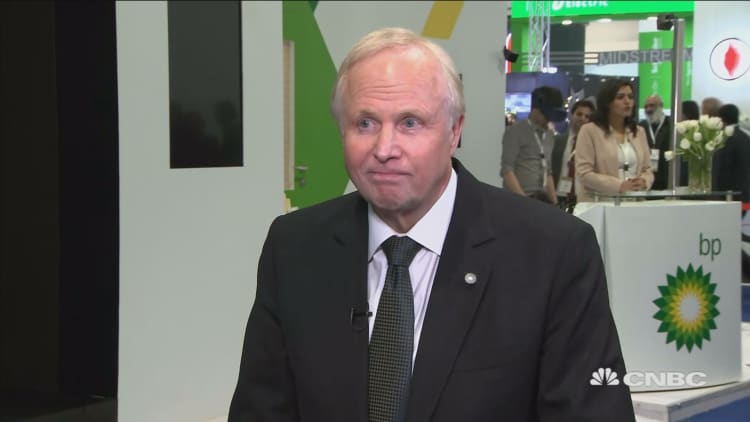
BP has invested more money in Egypt in the last two years than anywhere else, the oil giant's Chief Executive Bob Dudley told CNBC.
"Today (the scale of our operations) is very big," Dudley told CNBC Monday. "We produce oil in the Gulf of Suez but really our focus in the last five years has been this big push for natural gas. All across from the Nile Delta, to the east, to the west of the Nile Delta, it's helping power the country and other companies are here as well."
"In the last two years we've invested more money in Egypt, in both of those years, than in any other country in the world for BP, so it's a really important place for us," he told CNBC's Dan Murphy.
Egypt might lack the oil producing clout of its OPEC neighbors to the west (Libya and Algeria) and east (Saudi Arabia) but it's pushing to become a Mediterranean energy hub, particularly in the natural gas sector. Cairo is expected to become a net gas exporter by the end of 2019 and the country has seen widespread interest in its natural gas potential — particularly after the success of Egypt's Zohr gas field, an offshore natural gas field in the Mediterranean Sea operated by Italian energy firm Eni.
Foreign direct investment (FDI) in Egypt's oil and gas sector reached $10 billion in the full fiscal year of 2017/18, the country's Petroleum Minister Tarek El-Molla told an Egyptian newspaper last August, and expects at least the same in 2018/2019. In December, El Molla said Egypt had signed over 12 exploration and production agreements with international oil companies (IOCs) during 2018. The petroleum minister told CNBC in January that Egypt's gas reserves could even be a catalyst for peace in the region.
'Big change'
The Egyptian economy has been on an upward turn since the political tumult brought on by civil unrest during the Arab Spring of 2011 and the overthrow of then-President Hosni Mubarak.
In 2016, Egypt was forced to request a three-year, $12 billion loan from the international Monetary Fund (IMF). As ever, the IMF aid came with strings attached, requiring the government to embark on a reform program that included cutting fuel subsidies, introducing VAT and floating its currency, the Egyptian pound. Egypt has been praised by the IMF for adhering to the program and the Fund sees its budget deficit and unemployment rate declining further this year; the IMF predicts GDP growth of 5.5 percent in 2019.

BP's Dudley praised the "strong set of reforms" that had been implemented in Egypt in recent years.
"We've seen this big change over the last four or five years that has fundamentally changed things. You go back, five or seven, eight years ago and electricity wasn't even assured each day and now the infrastructure's here ... You're actually seeing Egypt move from a producing country into one that's going to begin to export energy as well and become a Mediterranean hub, it's very exciting."
BP announced the first gas production from the second stage of its large gas venture in Egypt, the West Nile Delta development, on Monday.
Stage one of the project, which started producing in 2017, included gas production from the first two fields, Taurus and Libra. The second phase of the project — the Giza and Fayoum development — includes eight wells and is currently producing around 400 million cubic feet of gas per day (mmscfd) and is expected to ramp up to a maximum rate of approximately 700 mmscfd. The third stage of the West Nile Delta project will develop the Raven field and production is expected in late 2019, BP said in a statement Monday.
When fully onstream in 2019, combined production from all three phases of the West Nile Delta project is expected to reach up to almost 1.4 billion cubic feet per day (bcf/d), equivalent to about 20 percent of Egypt's current gas production. All the gas produced will be fed into the national gas grid. BP has an operating stake of 82.75 percent in the development, the company noted.
Asked how much BP could spend in Egypt in 2019, Dudley said the amount would be significant. "There will be a third phase we're spending on, we're exploring today with other companies ... (So we'll be spending) $1.8 billion give or take. That's a lot," he said.


